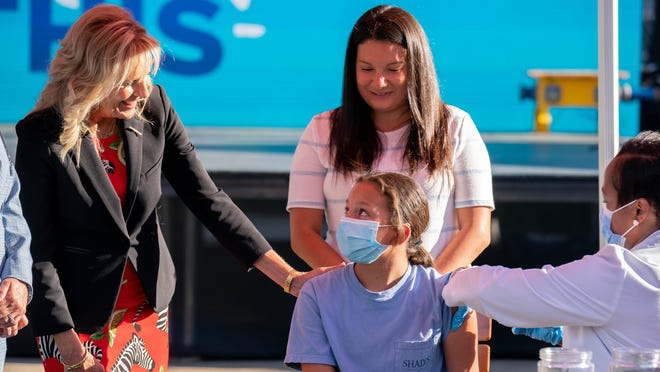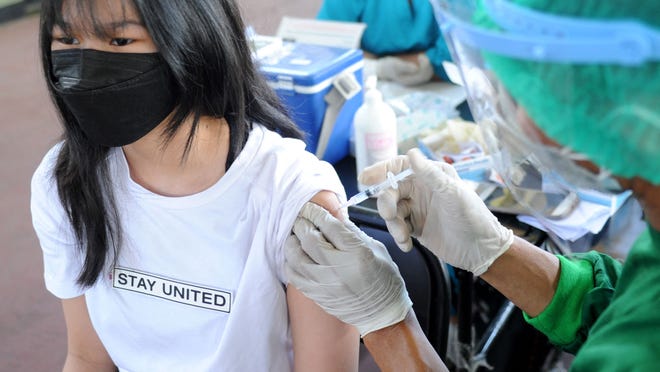Vaccinated teachers and students don’t need to wear masks inside school buildings, the Centers for Disease Control and Prevention said Friday in relaxing its COVID-19 guidelines.
In guidance released Friday, the CDC called a return to in-person learning “a priority.”
The changes come amid a national vaccination campaign in which children as young as 12 are eligible to get shots, as well as a general decline in COVID-19 hospitalizations and deaths.
“We’re at a new point in the pandemic that we’re all really excited about,” and so it’s time to update the guidance, said Erin Sauber-Schatz, who leads the CDC task force that prepares recommendations designed to keep Americans safe from COVID-19.
The CDC recommends anyone over the age of 2 who isn’t fully vaccinated – students, teachers and staff – continue to wear masks indoors and to try to keep 3 feet of distance.
Randi Weingarten, head of the American Federation of Teachers, the country’s second-largest national teachers union, said the new guidance was grounded in common sense, as it emphasizes children learn better in classrooms and vaccines are the best way to stop the spread of infections.
“It also makes clear that masking is important in the absence of vaccination,” she said.
Also in the news:
►Arizona on Friday reported its biggest daily increase in COVID-19 cases in two months.
►After Tennessee lawmakers chastised state health officials for encouraging teenagers to get vaccinated against the coronavirus, the Department of Health instructed its county-level employees to halt vaccination events focused on adolescents and stop online outreach to teens, according to department emails obtained by The Tennessean, part of the USA TODAY Network.
►Do you need a vaccine passport to travel? The answer is no – for now, anyway. But you may need one to get into your favorite restaurant.
►Michael Andrew, a U.S. swimming star who will compete in multiple events in Tokyo later this month, became the biggest Olympic name yet to reveal he has not been vaccinated. Thursday, Olympic officials said fans would not be allowed at the games amid the state of emergency in Tokyo.
►All of Maryland’s reported coronavirus deaths last month were made up of unvaccinated people, as well as most of the new cases and hospitalizations, the state reported Tuesday.
►Cases have increased over 160% in Los Angeles County over the last week, though vaccinated people remain well protected, the Los Angeles Department of Public Health said.
►Africa marked its worst pandemic week ever last week, surpassing its second wave peak, the World Health Organization said. COVID-19 cases have risen for seven consecutive weeks in the region, the organization said.
►The U.K. has seen daily coronavirus infections hit a near six-month high as coronavirus spreads among younger age groups.
►Australian authorities are further tightening restrictions in Sydney after reporting 44 new community cases, the largest number since a coronavirus outbreak began there last month. The city of more than 5 million is already in lockdown.
►Officials in Thailand have announced a seven-hour curfew and other restrictions for the capital and nine other provinces to try to slow a growing number of cases and deaths in a coronavirus surge.
📈 Today’s numbers: The U.S. has more than 33.8 million confirmed COVID-19 cases and more than 606,700 deaths, according to Johns Hopkins University data. The global totals: more than 185.8 million cases and more than 4 million deaths. More than 158.28 million Americans — 47.7% of the population — have been fully vaccinated, according to the CDC.
📘What we’re reading: Why do some people catch it while others – sometimes even sleeping in the same bed – escape without symptoms? The explanation, a study suggests, may lie in genetics. Read more here.
Keep refreshing this page for the latest news. Want more? Sign up for USA TODAY’s Coronavirus Watch newsletter to receive updates directly to your inbox and join our Facebook group.
South Carolina governor asks health department to not go door-to-door
South Carolina Gov. Henry McMaster has asked the state Department of Health and Environmental Control to not go door-to-door to increase vaccination rates despite a federal initiative to do so.
McMaster said in a letter to DHEC that taking the vaccine is a personal choice for South Carolinians and that information about the vaccine and access to the vaccine has been provided to the public. He added that the initiative from President Joe Biden’s administration for door-to-door outreach was “bad policy.”
“The prospect of government vaccination teams showing up unannounced or unrequested at the door of ‘targeted’ homeowners or on their property will further dete
riorate the public’s trust and could lead to potentially disastrous public safety consequences,” McMaster said in his letter. Read more here.
– Marcus Navarro, Greenville News
As COVID-19 ebbs, dating and hookups are back
After a year of little socialization, thanks to vaccines, the dating scene is bouncing back.
Some people are getting back out there to try to find “the one” while others are looking for casual hookups after a year of social distancing. But the return to dating has some people feeling overwhelmed.
Experts say the process may feel overwhelming due to continuing concerns about the coronavirus as well as an increase in social anxiety. This is especially true for people who are trying to make up for lost time by cramming in a bunch of dates. Read more here.
– Sara M. Moniuszko
Debate rages as states cut jobless aid, workers seek better pay
While the economy took a major leap forward in June when employers added 850,000 jobs, many businesses say they are struggling to find workers.
Some employers and Republican lawmakers blame the shortage on the federal jobless aid, which they say discourages people from returning to work. Economists disagree about whether the extra assistance is holding back job searches, even as 26 states end the federal boost of $300 a week before it officially ends on Sept. 6.
What’s clearer is that some workers, particularly those who earn low wages, are being more selective about where they work. They’re determined to find better paying, more fulfilling jobs than the ones they left or lost during the pandemic.
“They know they’re going to have to go back to work,” says Andrew Stettner of The Century Foundation, a left-leaning think tank. “People are looking for the right job that comports to their feelings of security and safety.” Read more here.
– Charisse Jones and Jessica Menton
CDC cautions third dose of COVID vaccine is not yet needed
Government public health agencies said Thursday a third shot of the COVID-19 vaccine is not yet needed after a new study found a booster dose of the shot made by Pfizer and BioNTech strongly extends protection.
The companies said they are developing a vaccine targeted directly at the delta variant and data demonstrated a third dose of their vaccine, given six months after the second, increases neutralizing antibodies five to tenfold against the original virus and beta variant.
In a joint statement late Thursday, the FDA and the Centers for Disease Control and Prevention emphasized that people who have been fully vaccinated do not need booster shots yet.
“FDA, CDC, and NIH are engaged in a science-based, rigorous process to consider whether or when a booster might be necessary,” according to the government statement. “This process takes into account laboratory data, clinical trial data, and cohort data – which can include data from specific pharmaceutical companies, but does not rely on those data exclusively … We are prepared for booster doses if and when the science demonstrates that they are needed.”
The study on the vaccine by Pfizer and BioNTech comes as another, published Thursday in the journal Nature, found a single dose of the Pfizer or AstraZeneca vaccines “barely inhibited” the delta variant, first detected in India. However, a second dose “generated a neutralizing response in 95% of individuals,” even if it was a little less potent than against earlier versions of the virus. Read more here.
– Karen Weintraub
Vaccine hesitancy isn’t sole reason for low rates of vaccination in Black, Latino communities
Black and Latino communities often have low vaccination rates, and the reason is often directed towards vaccine hesitancy. A study by CommuniVax shows the reason is more nuanced.
The medical anthropologists who contributed to the study shared in The Conversation that many people in these communities are not “vaccine hesitant” but rather “vaccine impeded.”
Those involved in the study reported feeling excluded from the vaccine because of a lack of access. Challenges included finding transportation, internet access and general information on how to get the vaccine.
Some, the study suggests, were ambivalent about the vaccine because they felt that the shot had the same threat level as getting infected with COVID-19. They thought that both could lead to illness or complications.
The CDC reports that 67.3% of adults have gotten at least one shot, well below President Joe Biden’s July 4 goal of 70%. About 20 percent of Americans are either refusing to get vaccinated or remain unsure, according to the U.S. House Select Subcommittee on the Coronavirus Crisis.
– Steven Vargas
Contributing: Erin Richards, USA TODAY; The Associated Press


